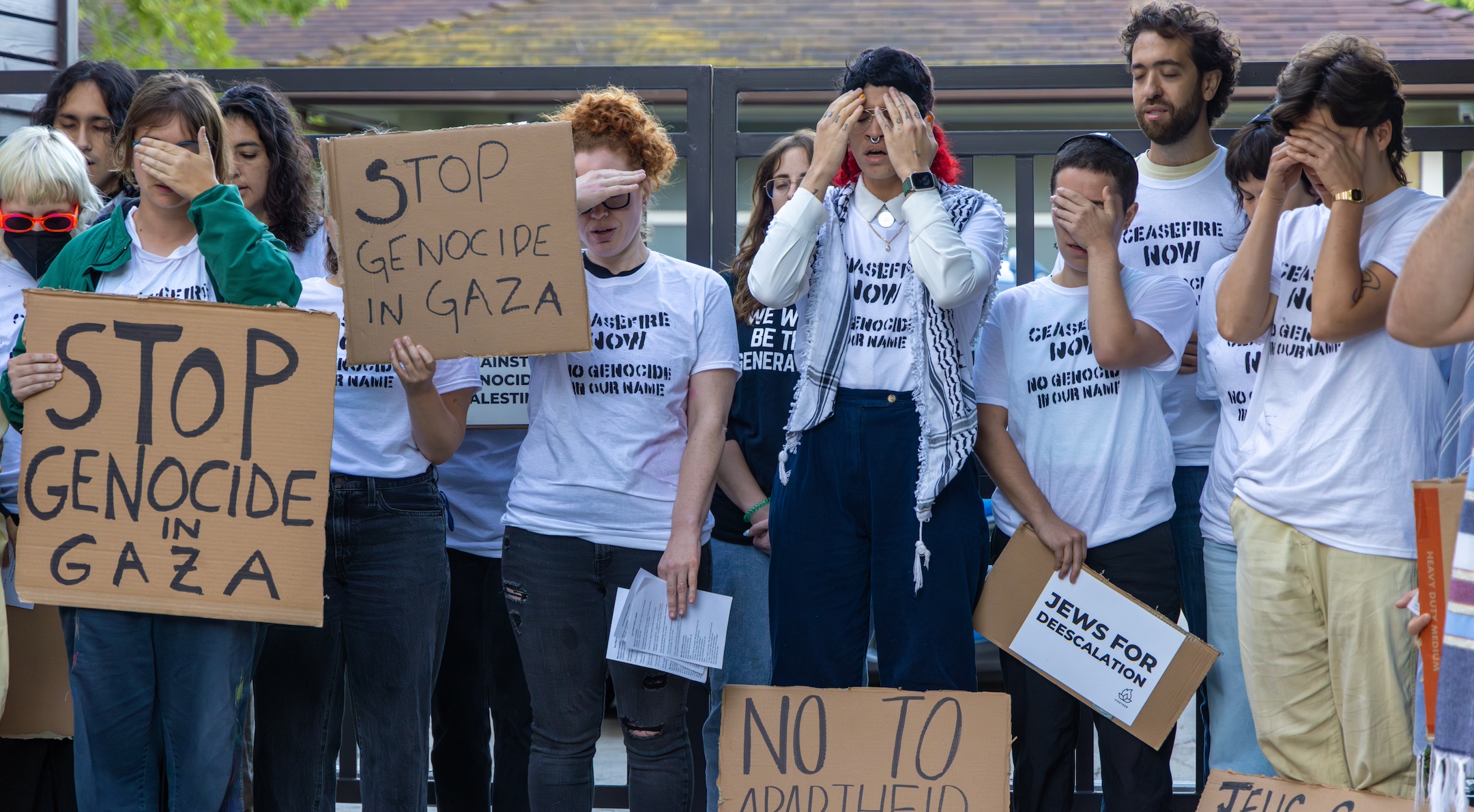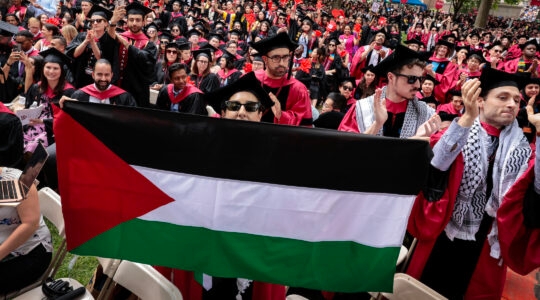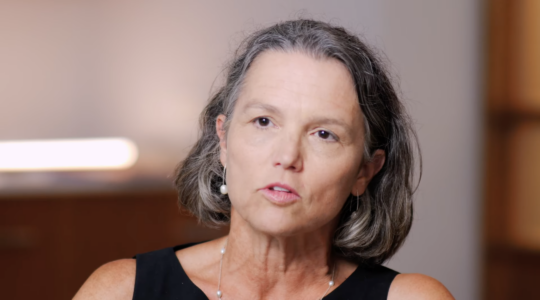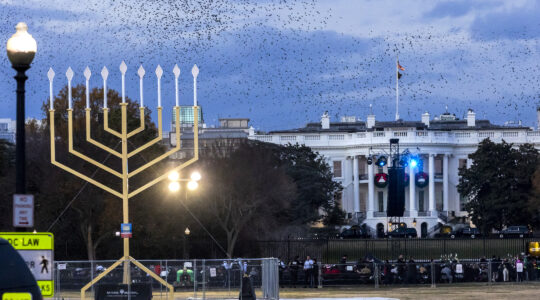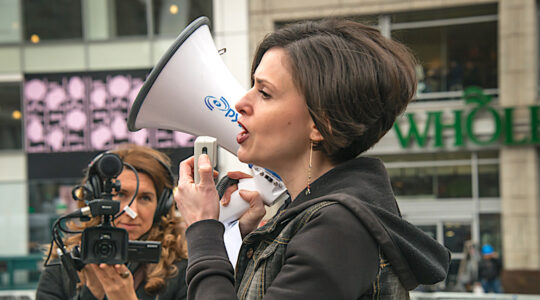This article was produced as part of JTA’s Teen Journalism Fellowship, a program that works with Jewish teens around the world to report on issues that affect their lives.
(JTA) — On a rainy day in late January, senior Natalya McConnell smiled as fellow Jewish teens joined her walkout for Palestine in Seattle’s wealthy neighborhood of Bellevue. But as the group approached Bellevue Square Mall, with its Brutalist architecture and soaring windows, her pride dwindled. Two teen girls pushed their way to the mall’s entrance while giving the middle finger to the protestors.
“I feel bad for those girls, honestly,” McConnell said to JTA. “Just to have that much ignorance and not feel sympathy for the suffering Palestinians are enduring right now.”
In the months following Oct. 7, many Jewish teens have joined the protests and demonstrations in support of the Palestinians and calling for a ceasefire in the deadly war that followed. Polling conducted since the war says that generational differences in how older and younger Jewish Americans view Israel have widened, with younger Jews hilding increasingly unfavorable views.
According to a Pew Research study in April, 52% of Jewish adults under 35 say the way Israel has carried out the war has been acceptable, compared to 68% of Jews ages 50 and older. Pew also found that “younger Jews are less likely than their older counterparts to say Israel’s reasons for fighting Hamas are valid, though about eight-in-ten or more in every age group say this.”
Some younger Jewish critics of Israel have played a prominent role in the campus protests against the war, joining and sometimes leading groups like Students for Justice in Palestine, Jewish Voice for Peace and IfNotNow.
Liv Kunins-Berkowitz, media coordinator for Jewish Voices for Peace — described on its website as a “progressive Jewish anti-Zionist organization” — says young members of the organization play a pivotal role in spreading its message.
“Throughout history, young people are often at the forefront of movements for social justice,” she said. “Many refuse to accept the world as it is and instead imagine the world as it could be — a place of safety and freedom for all human beings.”
In part this perspective comes from their age, according to Dov Waxman, the Rosalinde and Arthur Gilbert Foundation Professor of Israel Studies at the University of California, Los Angeles. “Young American Jews, born decades after Israel’s founding, have no nostalgic memory of Israel’s early years and no experience of the emotional highs and lows of the Six-Day War,” Waxman wrote in a paper about the Jewish generation gap on Israel. “Nor do they even recall the hopes that accompanied the Oslo peace process in the 1990s,” which was intended to bring about separate Jewish an Palestinian states.
Despite Jewish involvement throughout their lives, some Jewish teens struggled to support the country, even with the backlash they feel from Jews around them.
At the New York City independent Jewish day school Ezra Beinart attends, pro-Palestinian views are rare among students. Ezra Beinart stands out within the Jewish community, slightly isolated for openly supporting a one-state solution amongst typically Zionist classmates. “While a big part of me would still very much appreciate a two-state solution, it seems less and less possible with settlement growth,” Beinart says.
He has engaged in frequent conversations about the Israeli-Palestinian conflict with classmates, many of whom hold a deep emotional connection to Israel either our of religious conviction or because, like perhaps most American Jews, they were raised in homes where support for Israel is an imperative.
“There are kids who refuse to interact with me or don’t want to be friends with me because of my politics, but I’m fine with that,” says Beinart. “And to be honest, if you’re someone who can’t get over politics when it comes to a friendship, then you’re not someone I need as my friend.”
At his school, attending Israel rallies, singing “Hatikvah” and learning Israeli history are built into the curriculum. However, Beinart refrains from these programs, uncomfortable with how much they conflict with his opinions. While the thought of traveling in November to the Washington D.C. March for Israel with his school and friends was appealing, Beinart stayed home, feeling unwelcome due to his critical beliefs towards Israel.
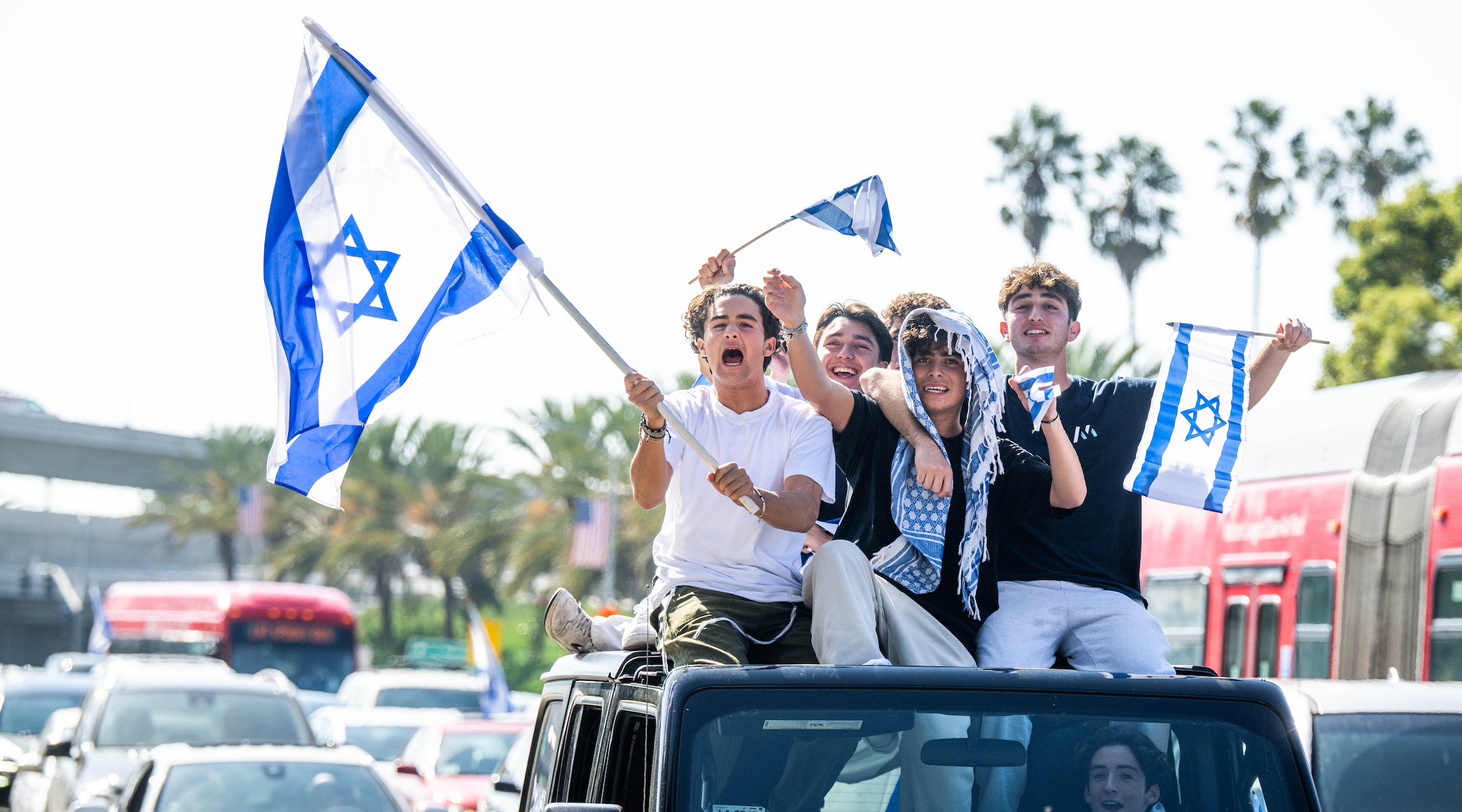
Teens fly Israeli flags during A Stand With Israel rally, Los Angeles, October 10, 2023. (Sarah Reingewirtz/ MediaNews Group/ Los Angeles Daily News via Getty Images)
Particularly when the school joins together to sing Israel’s national anthem, Beinart will catch peers watching him, seeming to expect him to act out, putting him at unease. “That’s very uncomfortable because I never really know what to do. Should I sing it, should I not?”says Beinart.
He says he appreciates when his friends openly contradict his critiques of Zionism. These debates help Beinart better understand other perspectives on the topic and allow him to deepen the complexity of his views. To Beinart, the focal point of these arguments ultimately comes down to security.
“It is hard for them [his peers] to wrap their mind around the idea that Palestinians won’t be as violent when they’re treated more fairly,” says Beinart. “That’s really where our ideas differ because even though they recognize the unfair treatment of Palestinians, they think there’s nothing we can do about it because they will always respond with violence.”
While Beinart has embraced his role as an outlier, the approach doesn’t work for all teens. S.E., a Jewish teen from New York City, hesitates to share their pro-Palestine views with Jews in their community, and asked only to be identified by their initials.
“I’m afraid of the blowback, and that’s a weakness of mine. I shouldn’t be afraid. I should stand in what I know to be true,” said S.E., who uses they/them pronouns.
S.E. is involved in their progressive synagogue where left-leaning beliefs on Israel are common. “One thing I love about the Jewish community that I grew up in was that there was quite a diversity of opinions on Israel in the synagogue’s population,” they said.
Yet S.E. worries that their support for the Palestinian cause might put them at odds even with the liberal Zionists who might support a two-state solution or who think it is inappropriate to criticize Israel during wartime. “I believe that the religious beliefs towards the state of Israel and the Jewish people being indigenous to the state of Israel are real and valid. I also believe that Palestinians are indigenous to the land where the state of Israel currently resides,” says S.E. “To me, Palestinian liberation means respecting that indigeneity in a way that the current state of Israel does not.”
At the same time, pro-Palestinian activists are often critical of any approach that recognizes Israel’s legitimacy. “It’s very polarizing to know that sometimes your opinion might not be accepted by either side at all,” said S.E. While S.E. still identifies as a Zionist and believes in the importance of a Jewish state, they believe the importance of an independent Palestinian state — separate from Israel — is something that needs to be recognized.
There have been a few conversations with family members where S.E. felt it was safe to share their opinions. “If I can muster the energy and bravery to do it, I argue with family members,” S.E. said. “We were able to have a really productive conversation where we were able to understand each other’s perspective and surprisingly agree on more than we thought we did.”
In an agitated conversation with their sister, S.E. realized the significance of labels such as “Zionist” and “pro-Palestinian.” “Our beliefs are fundamentally similar, but sometimes we disagree on the language used,” they said.
“This [labeling] leads people to think Jews are a monolith in our opinions, which we’re not.” says S.E. “To me, the idea that either you unconditionally support or denounce Israel is a false dichotomy.”
However, others believe labels to be a key facet of how they identify as support for Palestine. To Natalya McConnell, the options are absolute: Being ethical means being in full support of an independent Palestinian nation, even if this is not possible alongside an independent Israel.
“Right now, the only way for Israel to exist, where it currently is, is by pushing other people off of that area,” says McConnell. “There should be one state that can be a safe place for all persecuted people, Muslim, Jews, Christians, anyone, to feel safe in that area.”
These views are ones that McConnell strongly stands by, despite backlash. “Even if it’s not favorable, even if it’s not popular opinion, even if you’re called a terrorist, which I have been called before, and even if it’s scary, it’s important to me to live up to the values of Judaism, and that means speaking up,” says McConnell.
McConnell attends a Reconstructionist synagogue that aligns itself with “movements to end the Israeli occupation.” The liturgy read at services has been changed to no longer say “Israel” but rather “our people” or “community,” according to McConnell.
McConnell sees this environment as having a direct impact on her views regarding Israel and Palestine. She feels unwavering support from the many Jews around her with similar perspectives.
“There are so many people in my community that I think are really impactful in why I support Palestine,” said McConnell.
“Obviously when people discuss the Torah or Bible, they’re interpreting it,” she says. “So we think it’s really good to interpret it in a modern way that seeks to be inclusive to everyone and doesn’t oppress others.”
S.E. rejects the idea that they are somehow disloyal or alienated from their sense of Judaism. “I’m proud to be a Jew, not just religiously. I will always call for the preservation of Jewish culture along with that of Palestinians,” says S.E. “I’m no less proud of being a Jew as I ever was, and I know that Jews around the world have the ability to think critically about the conflict.”
Since Oct. 7, Beinart has struggled to confidently label his ideal solution for the Israel-Palestine conflict. (His father, journalist Peter Beinart, is widely known for having given up on the traditional two-state solution and arguing that Zionism and liberalism are incompatible.)
Besides wanting to see an end to Israeli occupation in the West Bank and treatment of the Palestinians that he compares to apartheid, “I realized that I don’t feel that comfortable waving an Israeli flag or waving a Palestinian flag that much,” says Beinart. “Neither of them really work for me anymore.”
And Beinart finds it difficult to leave behind the Jewish values taught at his day school and largely accepted by his peers. “It’s tempting to be a Jewish nationalist and think about how we have been oppressed for 2000 years,” says Beinart. “Sometimes I catch myself drifting into that and it makes a lot of sense to worry about yourself first, but I don’t think this is necessarily the right way of thinking.”
JTA has documented Jewish history in real-time for over a century. Keep our journalism strong by joining us in supporting independent, award-winning reporting.
